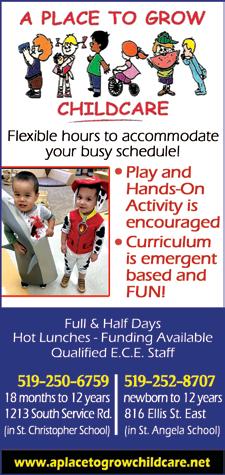
2 minute read
Health Matters: Talking To Your Kids About Substance Abuse

HEALTH MATTERS Tips For Talking To Your Child About Alcohol And Cannabis
Advertisement
Supplied By The WECHU

Open and regular communication (a “serious talk” may even be needed) with your child is a good strategy to prevent youth substance abuse. © Can Stock Photo/monkeybusiness
Young people face tough decisions around a number of life stressors and social pressures on a daily basis.
I need to get my grades up. I’m letting people down. What do my friends really think of me?
With these types of pressures, it is natural that youth may be looking for a way to escape or deal with their feelings — and when stressors pile up, they may turn to alcohol or cannabis to “get away from it all”.
With legalization of cannabis for adult use and increases in places to buy alcohol and cannabis, including through home delivery, youth have more exposure and access than ever before.
The human brain continues to develop into the mid-twenties; because of this ongoing development, youth who use alcohol and/or other drugs have a higher risk for harm to brain function and mental health. In fact, by delaying alcohol use to a later age, children can minimize the long-term negative impacts of alcohol consumption on memory, learning, and decision-making.
Parents play key roles in supporting children on decisions related to their health and well-being. It is important for parents to build an open, caring relationship with children and model healthy behaviours as ways of dealing with stress.
Listed here are some strategies parents can use, which can help delay or prevent youth substance use . . . • Have regular, open conversations with your child and listen without judgement. • Spend one-on-one and quality time together. Remind them that you love them. Eating together, for example, encourages open communication and sharing. • Offer to help with anything troubling your child, so they feel supported and can build positive coping skills. • Know what is going on in your child’s life, who they spend time with and where. Take interest in their hobbies and social life. • Teach your child to: choose friends who are supportive and non-judgmental, avoid peer pressure, and not to use substances. • Set expectations and consequences together around substance use, so rules are understood and respected. • Be a positive role model. Show that you can have fun without substances and do not provide cannabis, alcohol, or other substances.
Visit: RethinkYourDrinking.ca/Parents for more tips. To find local support and services for help with substance use issues, refer to: WECHU.org/GetHelp. You can also follow the Windsor-Essex County Health Unit on Facebook or Twitter. The Windsor-Essex County Health Unit (WECHU), in partnership with other agencies and health care providers, seeks to enable all Windsor and Essex County residents to be as healthy as possible. The unit is located at 1005 Ouellette Avenue in Windsor.










